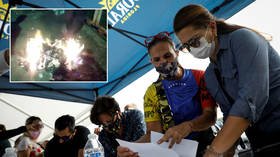WATCH: Russia's Angara A5 'eco-space rocket' successfully fires payload into orbit for first time in 6 years
The Russian Space Forces have conducted a successful second test launch of the Angara A5 heavy-lift space launch vehicle, six years after the first test flight in 2014.
Launched from the Plesetsk Cosmodrome in Mirny, about 800km north of Moscow, the rocket was fired into the sky at 8.50am Moscow time.
The rocket flew for a little over 12 minutes before a mock spacecraft payload separated from the third stage of the launch vehicle and entered into orbit. Initially, the rocket launch was planned for late November, but was postponed to December due to technical reasons.
READ MORE: Russia test-launches new space eco-rocket Angara right into geostationary orbit
In celebration, Dmitry Rogozin, the head of Russia's Space Agency Roscosmos, posted on Twitter: "It flies, damn it!"
Она летает, черт возьми!!! pic.twitter.com/nVAwwXZ93x
— РОГОЗИН (@Rogozin) December 14, 2020
Touted as an eco-rocket due to its usage of kerosene and oxygen as fuel, the Angara rocket family is the first Russian space booster designed from scratch since the fall of the Soviet Union. Development originally began in the 1990s, and the Angara A5 variant was first tested almost twenty years later, in 2014.
The company responsible for the rocket, the Khrunichev State Research and Production Space Center, is well known for its unprofitability, having reported a debt of 84 billion rubles ($6 billion) in March 2019. Later that year, in June, the financial report of the center revealed the production cost of a rocket as seven billion rubles ($95 million).
Roscosmos' innovations have been praised worldwide, including by South African space entrepreneur Elon Musk who promoted the idea of a reusable Angara rocket.
Russia has excellent rocket engineering & best engine currently flying. Reusable version of their new Angara rocket would be great. https://t.co/6RLvf5R4ni
— Elon Musk (@elonmusk) March 7, 2019
In 2018, Rogozin revealed that Russia plans to use the Angara rocket for regular missions to the Moon.
If you like this story, share it with a friend!














